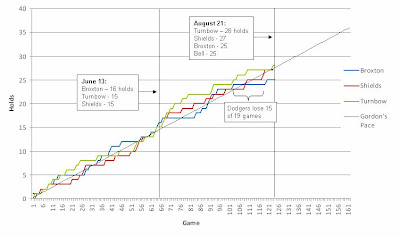
Russell Martin is our All-Star catcher and some have argued "the face of the Dodger Franchise" (I would vote for Vin Scully, but that's another story). So we don't mean to bag on him even when his overuse, at the non-nimble hands of Grady Little when filling out lineup cards exactly the same every single frickin' game, has caused Martin's numbers to decline down the stretch.
But today's LA Times article not only reflects poorly on Martin (in the wake of the Dodgers' impotent loss last night to the Mets, 5-2), it also impugns the entire educational system of his home country, Canada:
The Dodgers got runners on in every inning except the fifth, but couldn't get any of them home until there were two outs in the eighth. They left the bases loaded in the first, stranded two runners in scoring position in the eighth and had the tying run at the plate in the ninth when Andre Ethier struck out looking to end the game.
All told, the Dodgers left 12 men on base and went one for nine with runners in scoring position while being held to fewer than four runs for the first time in 10 games. If they had built any offensive momentum during a recent streak that saw them score 54 runs in winning six of nine games, Mets starter Oliver Perez robbed them of it Friday.
Or maybe it never existed in the first place.
"I don't believe in momentum," catcher Russell Martin said. "What's momentum? It's one game at a time. In baseball, you can win or lose any given day no matter who's on the mound."
Ah, Russell? You should probably start believing in momentum, seeing how it's a fundamental part of classic Newtonian mechanics. I don't know if they taught this up in Canada, but momentum (p) is the product of mass (m) and velocity (v) such that p = mv. It's pretty elementary to any high-school physics class.
To be fair, though, it is understandable that Martin is a little fuzzy on this equation given that Dodger third-base coach Rich Donnelly also lacks an understanding of this fundamental construct. It was here, in the Dodgers' own house of horrors known as Shea Stadium, where Donnelly sent home Jeff Kent (6' 2", 210 lbs) and J.D. Drew (6' 1", 200 lbs) to home on the same play. Both Kent and Drew were coming home to meet their opponent, Paul Lo Duca (5' 10", 205 lbs). Yet despite both Kent and Drew having velocity (albeit less velocity, in Kent's case), and Lo Duca basically motionless (v = 0) at the plate, Donnelly had neither Kent nor Drew pound into Lo Duca to dislodge the ball and/or railroad the catcher. Everyone knows the result of this disaster--yet only now is it becoming clear that a lack of physics knowledge on the Dodgers is at the root of the problem.
Donnelly, for the record, had better learn this equation soon now that we've got Matt Kemp in the lineup more often. Kemp is 6' 2", 230 lbs, and runs like a freight train. If he ever wimps his way into home during a play at the plate, I will probably throw something at my television set.
Getting back to the Dodgers, though--momentum is real, and it's important, and if we are going to have any chance at making the playoffs, it means keeping momentum when you've got it. It means crashing into the catcher at home plate. It means knocking runners in when you've got them on base. It means winning strings of consecutive games to buoy the spirits of your team as well as deflate the spirits of our competitors being chased in the standings. I know that you're tired, Russell, and I don't expect you to be Albert Einstein with the physics. But the Dodgers need momentum in the worst way, and everyone had better be on the same page (of the physics textbook).





































